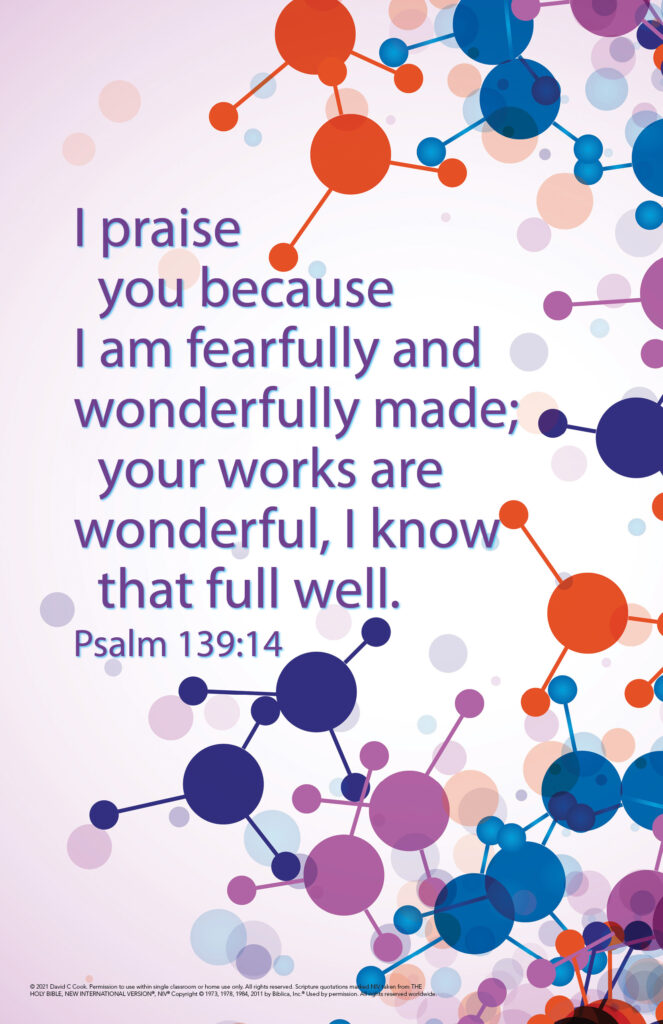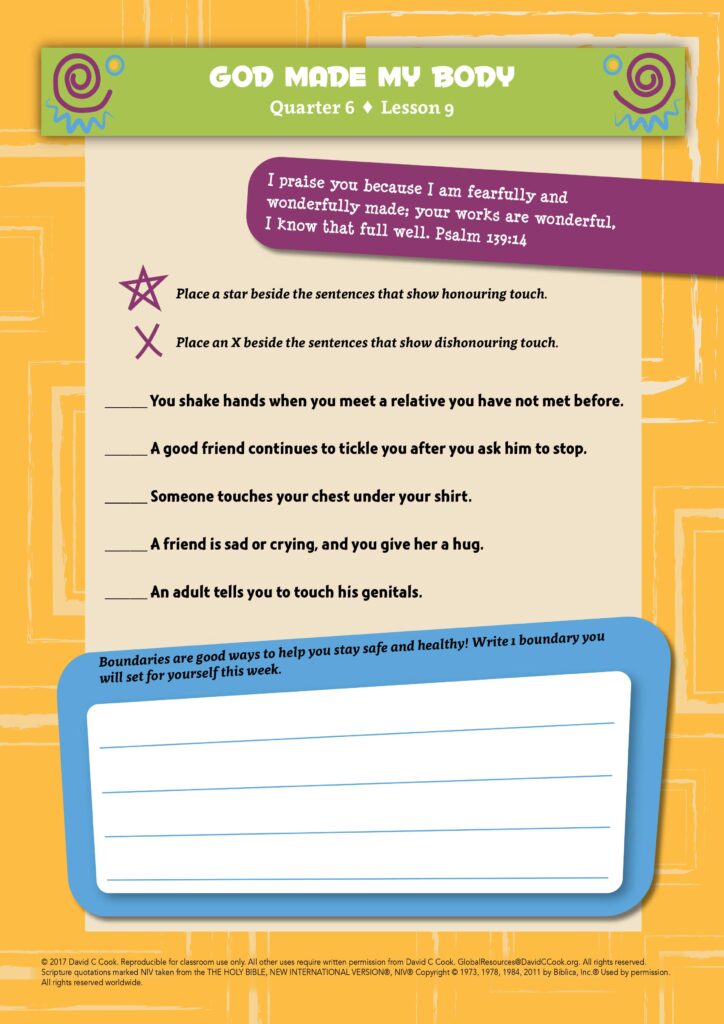During the lesson, the information for you to know is written in regular type, and what we suggest speaking or reading aloud to children is in bold. All resources for this lesson, including the Teacher Guide, Student Page, Family Connection Card, and other resources can be downloaded in a ZIP file by clicking on the following link:
In some lessons you will find "resource articles." These are articles written by experts from around the world to help equip you for your work with children and adolescents. Share them with parents or guardians if you consider it appropriate.
I praise you because I am fearfully and wonderfully made; your works are wonderful, I know that full well.
Psalm 139:14
Do you ever wish you were different than you are? Taller, shorter, smarter, funnier? Most of us are discontent with who we are. Yet God created each of us perfectly. He says that we are made in wonderful ways!
When we do not honor the way God created us, we do not expect others to treat us with honor. When we see ourselves as unworthy or unlovable, it can be easy to allow unhealthy things to happen. We may do things to harm ourselves. We may allow others to harm us because we do not feel worthy of love or protection. But when we dishonor ourselves, we are really dishonoring something wonderful God has created. We need to ask for God’s forgiveness. Spend a few moments asking the Holy Spirit to show you ways that you have dishonored yourself. Ask Him to help you honor your body as well as your whole being this week.
Share with the families of your students that you will be teaching a sensitive topic the next few weeks: honoring our bodies. Share the Resource Articles included in this unit with them.
Teacher Tip: If possible, email or text the Family Connection Card to the families of your students.
Greet the children as they come into class. Let them know today will they begin a set of lessons about our bodies. Explain that often it is more comfortable to talk about these things with our own gender. So girls and boys will have separate classes for 3 weeks.
Divide the children into a boys’ group and girls’ group. If possible, have a man teach the boys’ session and a woman lead the girls’ session. Be sure that the 2 groups are in different teaching spaces, preferably where they cannot see or hear each other.
Give a Gravel to half of your children and a leaf to the other half. Tell them to keep what they have a secret from the other children.
Let’s start today’s lesson with an activity about respecting others. Those with Gravels will respect what the other students say and those with leaves will not respect what the others say. Each of you will go to 4 other students and ask if you can shake their hands. The other students can answer yes or no.
So if you have a Gravel and the other student says yes, then you will shake her hand and if she says no, then you will not shake her hand.
If you have a leaf and the other student says yes, you will not shake his hand and if he says no, then you will try to shake his hand.
Allow the children to do the activity. Then call the group together.
Ask 3 children to share how they felt.
Ask 3 different children to share how they felt.
When you answered yes or no, you were telling others what your boundaries are. Those who listened and did what you asked respected your boundaries. Boundaries are limits we set to protect ourselves in different situations. It is important to have healthy boundaries.
Ask 3 different children to respond.
So how do you know what healthy boundaries are? A good rule to follow in life is found in Jesus’ words in the Bible. Listen to this verse:
Do to others as you would have them do to you.
Luke 6:31
It is important to treat others with respect and honor, just like you would want them to treat you!
In our activity, you could decide who could shake your hand and who could not. In life, we can sometimes decide who we want to be close to us and how close we want them to be. Today we will learn about having healthy boundaries with our bodies.
Today we will celebrate the human body. God created and loves each of us from head to toe. It is usually more comfortable if we are all the same gender when we talk about our bodies. That is why the boys and girls are meeting in different places. Let’s start today’s lesson by hearing what the Bible has to say about our bodies.
Today we will talk about our amazing bodies. Let’s hear what the Bible has to say about them.
Read the verse slowly 3 times, directly from your Bible.
If you are using the Memory Verse Poster, show it to the students.
I praise you because I am fearfully and wonderfully made; your works are wonderful, I know that full well.
Psalm 139:14

Let’s pretend to be scientists and discover more about God’s wonderful creation—the human body, which is an amazing gift from God. Here are just a few things that are amazing about our bodies.
Have the children feel their beating hearts with their hands.
These are just a few of the amazing things about the amazing body God made. God made every single person unique, and He celebrates our differences. Bodies come in different colors, shapes, and sizes. Some bodies have injuries or disabilities. Did you know that when people have disabilities in one part of their body, God often helps them to become very strong in other parts of their bodies? For example, people who are blind often can hear things that the rest of us cannot.
God loves us all the same, no matter how different our bodies are. He wants us to love each other, no matter what we look like or what our disabilities are. We should never make fun of people who are different from us. God loves each person.
God made boys and girls different. Sometimes people use bad words to talk about certain body parts. We will not use those words. That is not honoring to God or to you. Instead we will use the real words a scientist or doctor would use.
Boys’ and girls’ bodies are made differently. The parts that are between your legs are called the genitals. These private body parts were made by God for very special functions. God gave adult married people a very special gift called sexual intercourse. Adult married people show their love to each other and make babies with these special parts.
Remind the children that they should never tease someone about these special private parts of their bodies. It is important to respect each other in this way.
Our bodies are amazing gifts from God. We can show our love for God by honoring our bodies. There are some good rules about honoring and dishonoring touch to help us respect our own and others’ bodies. Honoring touch is healthy, good for us, and pleases God. Dishonoring touch is unhealthy, causes emotional pain, and does not please God. Listen as we learn these ways to show respect.
Your whole body, head to toe, belongs to you and to God.
Mouth, chest, buttocks, and genitals
Your private parts are off-limits for others to touch unless there is a good reason. A good reason might be that you are hurt and a doctor or nurse is taking care of you.
No one should touch you without your permission. They should stop touching you when you tell them to. This even includes tickling, hugs, and kisses. These things are not wrong when they are done in loving ways. But if you do not like the way that someone touches you, speak up and tell him to stop. If the person does not stop, tell a trusted adult what has happened.
If someone else does not want to be touched, you should respect his wishes.
Everyone needs honoring touches to feel loved and happy. What are honoring touches?
Handshakes, wanted hugs, and wanted cuddles
I will read some situations to you. After I read each situation, tell me if it shows honoring or dishonoring touch. Honoring touch is healthy and good for you and pleases God. Dishonoring touch is unhealthy and hurts you and makes God sad. Are you ready?
If they feel comfortable, have the children explain why they think that the statements describe honoring touch or dishonoring touch.
When you have finished the list, ask if anyone wants to say anything or ask any questions. Tell the children that you would be happy to talk with them after class if they have been hurt by someone’s touch. If a child tells you about abuse, offer to pray with the child. Seek help for that child so that he or she can begin to heal from the abuse.
When we learn to honor our own and others’ bodies, we are doing what the Bible says. Here is a verse that talks about how we should treat one another.
Show proper respect to everyone.
1 Peter 2:17
Today we have learned some things about honoring and dishonoring touch. We also learned that it is good to have healthy boundaries about what kinds of touch are good. We have learned that God created our amazing bodies.
Get with a partner now. Talk about 1 boundary you will set for yourself this week. Perhaps it is that you learn to respect yourself by asking someone to stop something. Perhaps it is that you use honoring touch to help a friend.
Give the children a few minutes to talk with their partners. Remind them to check with each other the next time they are together to see how they did with their boundaries.
Optional: If you are using the Student Pages, allow the children to respond individually on them with how they will set a boundary. They can then share it with their partners.

Now we will joyfully worship God with our bodies just as the verse in Psalm 139 says.
Read Psalm 139:14 aloud to the class again.
I praise you because I am fearfully and wonderfully made; your works are wonderful, I know that full well.
Psalm 139:14
Choose a praise song the children know. If you have it available to play for them, do so. Sing it first without moving. Then suggest that as they sing it a second time they dance to honor God, who made their wonderful bodies.
Close class by praying a blessing based on Psalm 139:14 over them.
Blessing: May you know that God has made you unique and beautiful. He says that you are wonderfully made! May you praise Him who made you.
Lead the children in singing this quarter’s song, if possible.
Life on Life ©2020 David C Cook. Reproducible for home or classroom use only. All other uses require written permission from David C Cook [email protected]. All rights reserved.